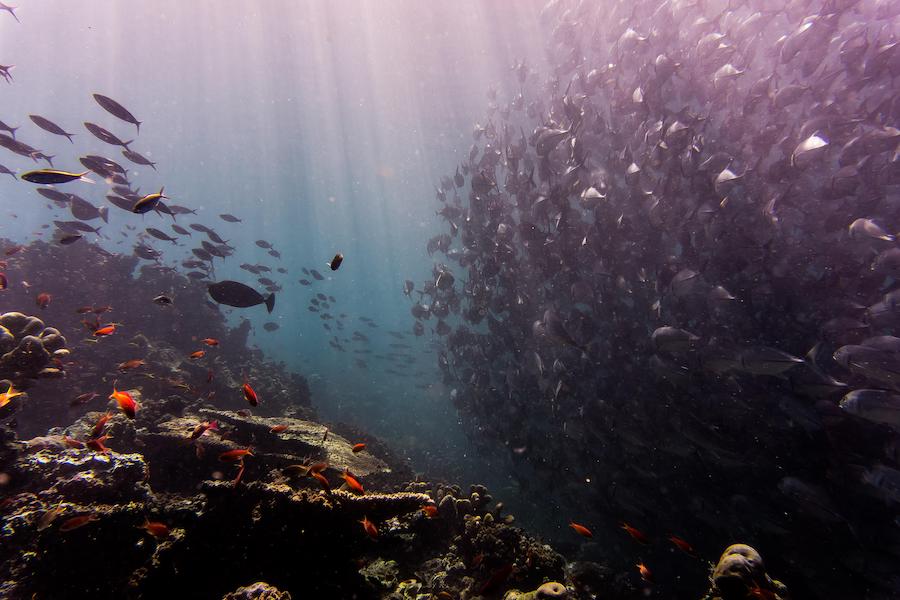The question of climate change is no longer whether it exists, but how far we are prepared to suffer its consequences. The question is no longer when, but how to prepare for it. There is no doubt that climate change will have a direct impact on the entire world population in the coming decades: rising waters, heat waves, hurricanes, cyclones… and there will be an increasing number of climate refugees. The ocean and the cryosphere are the main regulators of the climate, protecting them means ensuring a better future for the next generations. It is no longer a time for rhetoric but for concrete action.
Ocean and cryosphere: role and functioning
The Ocean is the source of life on Earth. It represents, in volume, 96% of the biosphere and provides many services: supply of oxygen and water, capture of CO2 and heat, source of protein, energy, economic, cultural and health services.
The Cryosphere (snow, ice, polar ice caps, mountain glaciers and frozen ground), which operates in symbiosis with the Ocean, is a stakeholder in most of these services. Glaciers regulate the water cycle, ice sheets reflect solar rays and reduce heat absorption, frozen soils store huge quantities of methane, a greenhouse gas.

The Ocean and the Cryosphere are therefore the main regulators of the climate. They influence the living conditions on Earth, not only of those who live on the coast and in icy regions, but of all populations on the planet.
Accelerating change and impacts on populations
The IPCC Special Report alerts us to a number of crucial issues related to climate change and also to the many consequences they will have for human societies.
• Increase in the number and intensity of extreme weather events: typhoons, cyclones, hurricanes, and storms will increase in number, but above all will intensify. In the coming years, we will witness more and more force 4 and 5 events.
• Accelerating sea level rise: new predictions indicate that if we continue at a current rate for greenhouse gas emissions, the level could rise by 61 to 110 cm by 2100 with an annual rate of 19mm/year compared to 3.6mm/year today. With 28% of the world’s population living in coastal areas, these phenomena will have dramatic consequences for millions of people. Islands in the Pacific are directly threatened as well as megacities located just at sea level: Jakarta, New York, Shanghai, Miami.


• Ocean warming: by absorbing the heat emitted by human activities, the temperature of the ocean increases, with a direct impact on marine biodiversity. Corals are the first to be affected, but the impact will be felt on all biodiversity, consequently threatening fishing and aquaculture activities.
• Decrease in oxygen quantities in the ocean: particularly due to ocean warming, water zones with very low oxygen levels have been detected in the ocean. This abnormaility is impacting biodiversity and fish stocks that cannot survive in these zones.
Take action without further delay
“When we have a certainty about everything that’s happening, it’ll be too late! “Hervé Le Treut, climatologist
We must all commit to fight for the protection of the ocean in order to make it a priority recognized at the international level. We must act with our votes, through our activism, and by changing our behaviours.
Surfrider Europe has been committed to the protection of the Ocean for almost 30 years and has made concrete proposals to international institutions, governments, economic stakeholders and civil society for improved regulations for ocean and climate protection. Through political lobbying, scientific research, and on-the-ground actions, Surfrider Foundation Europe :
– Raises public awareness and advocates for regulatory progress at national and European levels since its creation in 1990
– Has been protecting the Ocean against pollution, plastics, oil spills and artificial coastlines since the 2000s with support from European and French institutions
– Co-founder of the Ocean Climate Platform in 2014, whose main achievements include the inclusion of the Ocean in the preamble to the 2015 Paris Climate Agreement and the production of the SROCC special report for 2019,
– Principle organizer of the Ocean Call, publishedin August 2019, which brought together 80 international actors committed to the protection of the Ocean and proposed more than forty concrete measures around sustainable tourism, biodiversity, plastic pollution and climate, for the health of the Ocean.

